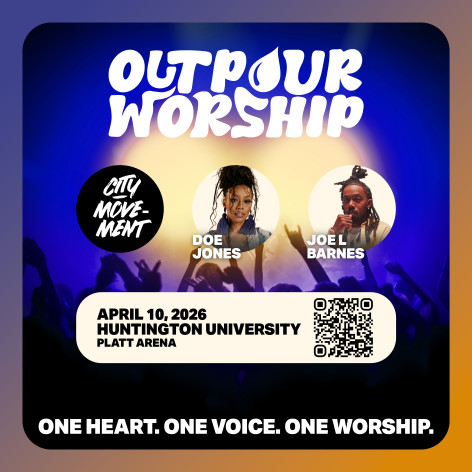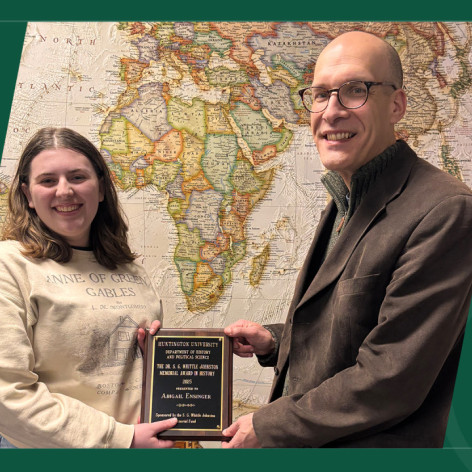CCCU honors Charles Curie as an outstanding alum
FOR RELEASE: Tuesday, October 21, 2003
Huntington, Ind. " The Council for Christian Colleges and Universities (CCCU) is currently celebrating Christian Higher Education Month. Of the nominees submitted by 107 member institutions, the CCCU chose 31 alumni to honor this year " one for each day in October. One such alum is Charles Curie, a 1977 Huntington College graduate. He will be featured on the CCCU web site on Monday, October 27, 2003, at www.cccu.org/chem. Nominees were chosen in five fields of expertise: government and law, arts and entertainment, community and society, science and technology, and business. This year's honorees include a congressman, a Major League Baseball umpire, a grief recovery counselor, Christianity Today's Most Influential Pastor, and more. Past recipients include Billy Graham, Speaker of the U.S. House of Representatives Dennis Hastert, recording artists Jars of Clay, Todd and Lisa Beamer, and Tony Campolo.
The following profile of Charles Curie will be featured on the CCCU web site.
~ ~ ~
Charles Curie
Advocate for the ill
When Charles Curie started out in social work more than 20 years ago, his circle of influence was a group of 8-12 people in an After Care group in rural Ohio. Today, his circle of influence encompasses thousands of Americans across the country.
Curie is Administrator of Substance Abuse and Mental Health Services Administration (SAMHSA), a division of the U.S. Department of Health and Human Services. He was appointed to this position by President George W. Bush in November 2001 and confirmed by the U.S. Senate shortly thereafter. He reports directly to U.S. Secretary of Health and Human Services, Tommy Thompson.
Today I see myself in a critical public policy leadership role which gives me the opportunity to try and help influence substance abuse prevention " to reach those individuals with mental illness and addictions, including children and youth at risk, said Curie. Each life God creates has great potential, and yet there are these illnesses which can ravage an individual, prevent them from being affirmed. My goal is to help bring wholeness to them from a large systemic opportunity.
SAMHSA's mission is to develop the Federal government's ability to target substance abuse and mental health services to the people most in need. SAMHSA is working towards achieving President Bush's goal of reducing current drug use in the U.S. by 10 percent over two years and 25 percent over five years in line with the National Drug Control Strategy released by the President in February 2002.
Curie has also been involved with Access to Recovery, a $600 million project to expand drug and alcohol treatment capacity for voucher programs, and to use faith-based service providers as well as medical-based. The impetus for the project, said Curie, is the recognition that the path to a person's wellness involves treating the mental, emotional and spiritual, as well as the physical aspects of the individual.
As a policy maker, a social worker and a Christian, Charles Curie sums up his passion in this way: My purpose in life is helping others know God and to see God's love and recognizing that there's a wide variety of ways of doing that. I feel called to assure that others have the opportunity to experience God's blessing.
SIDEBAR:
Profession:
Administrator, Substance Abuse and Mental Health Services Administration
Education:
B.A., psychology and sociology, Huntington College, 1977
M.A., School of Social Services Administration, University of Chicago, 1979
Certified by Academy of Certified Social Workers (ACSW)
Former positions:
Deputy Secretary for mental health and substance abuse services for Department of Public Welfare of the State of Pennsylvania
Director of Risk Management Services for Henry S. Lehr Inc.
President/CEO of the Helen H. Stevens Community Mental Health Center
Executive Director/CEO of the Sandusky Valley Center
Recognitions:
Nationally recognized mental health and drug and alcohol Medicaid managed care program.
2000 Innovations in American Government Award for establishing and implementing a policy to reduce and ultimately eliminate the use of seclusion and restraint practices in the state hospital system.
How a Christian college gave him a compass for life:
It was during a period time as I began to take hard look at what I wanted to do with life, what was important. I came to realize that Christian faith was not just religion, we're talking about a relationship with God. Tying my relationship with God to my purpose in life and work began the quest that has brought me to this point.



